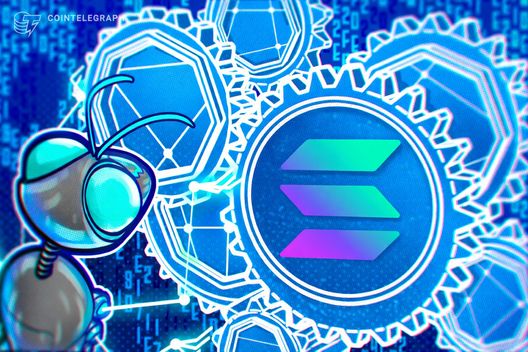In an exciting development within the cryptocurrency landscape, DeFi Development (DFDV), a Florida-based real estate tech company previously known as Janover, has made headlines by significantly increasing its investment in Solana’s native token, SOL. The firm announced on Monday that it has acquired 172,670 SOL at an average price of $136.81, raising its total cryptocurrency holdings to over $100 million. This latest purchase, valued at $23.6 million, represents the largest transaction since the company shifted its focus towards digital assets just last month.
With this latest acquisition, DeFi Development now holds 595,988 SOL, translating to an approximate value of $105 million based on current market prices. Not only does the firm plan to hold these tokens long-term, but it also intends to stake them with various validators, a move aimed at earning staking yields and enhancing its overall return on investment.
In response to the news, DeFi Development’s stock saw a substantial surge of 20% during the early moments of Monday’s trading session, following a notable 30% gain on Friday. This uptick can be attributed to a broader rally in cryptocurrency prices, with SOL experiencing a resurgence of over 20% in the past week, climbing to $180 for the first time since February.
DeFi Development’s latest strategies mirror a growing trend among public companies embracing cryptocurrencies as a method to bolster their balance sheets. While many firms are gravitating towards Bitcoin, led by the playbook established by notable proponent Michael Saylor of MicroStrategy (MSTR), others are exploring alternative options like Solana. Under the guidance of new executives from crypto exchange Kraken, the company has been actively accumulating SOL and outlining ambitious plans to raise $1 billion to further its investments in the Solana blockchain.
“This move not only illustrates DeFi Development’s long-term commitment to the Solana network but also highlights the accelerating interest in digital assets among traditional financial entities,” observers note.

DeFi Development’s Significant Solana Investment
DeFi Development (DFDV), formerly known as Janover, is making waves in the cryptocurrency space with its substantial acquisition of Solana’s SOL tokens. Here are the key points regarding this development:
- Acquisition Details:
- DFDV bought 172,670 SOL at an average price of $136.81, totaling $23.6 million.
- The company’s total Solana holdings now exceed $100 million, with 595,988 SOL tokens.
- Long-term Strategy:
- The firm plans to hold the tokens long-term and stake them with various validators, including its own.
- This strategy is aimed at earning staking yield, creating a potential source of passive income.
- Market Impact:
- Following the announcement, DFDV’s shares surged by 20% to $90, building on a 30% gain from the previous Friday.
- The price of SOL saw a significant increase of over 20% in the past week, reaching $180.
- Reflecting Broader Trends:
- The acquisition reflects a growing trend of public companies diversifying their balance sheets by investing in cryptocurrencies.
- Unlike many companies primarily focusing on Bitcoin, DFDV is concentrating on Solana, adapting to market demands.
- Future Plans:
- The company intends to raise $1 billion for further acquisitions of SOL, indicating confidence in Solana’s potential.
This investment strategy by DeFi Development might inspire other firms and individuals to consider the benefits of cryptocurrency investments as a long-term growth opportunity, reflecting shifts in traditional finance.
DeFi Development’s Bold Crypto Moves: A Game Changer in Real Estate Tech?
In a significant development within the realm of cryptocurrency and real estate technology, DeFi Development (formerly Janover) has made headlines with its substantial investment in Solana’s native token, SOL. This strategic pivot not only showcases the growing acceptance of cryptocurrencies in mainstream finance but also places DeFi Development in direct competition with other tech-forward firms venturing into the digital asset space.
Competitive Advantages: The firm’s embrace of Solana comes at a time when many companies are opting to anchor their crypto investments in Bitcoin. By choosing to invest heavily in SOL, DeFi Development sets itself apart as an innovator, targeting the faster transaction speeds and lower costs that Solana offers compared to Bitcoin. This could attract investors looking for diversification beyond Bitcoin, especially in light of recent Solana price rallies. Additionally, holding and staking a significant amount of SOL allows the company not only to potentially enhance its portfolio value but also to generate passive income through staking yields.
Competitive Disadvantages: However, the strategy is not without its risks. The volatility associated with cryptocurrencies, especially non-Bitcoin assets like SOL, could pose challenges if the market experiences a downturn. While DeFi Development’s share price surged following the news, the long-term sustainability of such a growth trajectory remains uncertain, especially if Solana fails to maintain its recent momentum. Moreover, the firm’s decision to pivot from traditional real estate tech operations may alienate stakeholders who prefer a more cautious approach given the tumultuous nature of cryptocurrency investments.
For investors and shareholders, DeFi Development’s strategy is a double-edged sword. On one hand, forward-thinking investors who believe in the future of blockchain and crypto may see this as a robust investment opportunity. On the other hand, conservative players looking for stable returns may find this pivot concerning, thereby creating potential pushback against the company’s strategic direction.
In essence, while DeFi Development’s move may attract a new wave of crypto enthusiasts and innovative thinkers, it also risks backlash from traditional real estate stakeholders. The next few months will be pivotal in determining whether this bold strategy will bear fruit or create challenges for the rapidly evolving landscape of real estate technology.

















